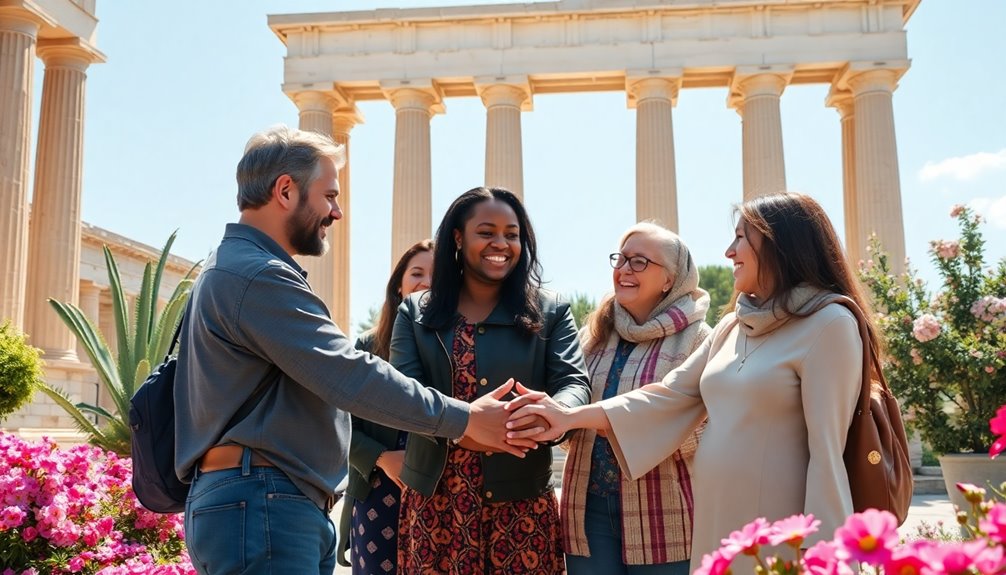Agape love is powerful because it's rooted in selflessness and prioritizes others' well-being unconditionally. You experience its transformative nature when you choose to show compassion, even to those who may not deserve it. This form of love fosters deeper connections and builds social harmony by challenging the idea of love as merely transactional. It thrives on acts of kindness and empathy, encouraging you to act selflessly, regardless of circumstances. By understanding its true essence, you can harness agape love in your life and relationships, discovering even more profound insights along the way.
Key Takeaways
- Agape love is unconditional and selfless, prioritizing the well-being of others, which fosters deeper connections and social harmony.
- It embodies a conscious choice to act with compassion, demonstrating a commitment to others regardless of their worthiness or actions.
- Agape challenges societal norms of individualism by encouraging acts of kindness towards everyone, including enemies, promoting communal responsibility.
- Its transformative power lies in its ability to heal relational wounds through forgiveness, patience, and mutual support, enhancing interpersonal trust.
- Agape love inspires action through community service initiatives, reflecting a commitment to social justice and the welfare of marginalized populations.
Introduction

In exploring the depths of agape love, you'll find it's more than just a feeling—it's a conscious choice rooted in selflessness and compassion. Agape is defined as unconditional love that prioritizes the well-being of others over personal desires. This form of true love isn't merely emotional; it requires deliberate action and commitment.
God's love exemplifies this sacrificial love beautifully, as seen in John 3:16, where He gave His Son for humanity's salvation. Such acts of love encourage you to embrace patience and humility in your relationships. When you engage with agape love, you're making the choice to love others without expecting anything in return.
This practice isn't just about grand gestures; it involves daily acts of kindness and empathy, fostering strong relationships and community bonds. By focusing on the needs of others, you promote social harmony and challenge yourself to grow.
Engaging in agape love can transform your interactions, leading to greater forgiveness, understanding, and acceptance. Ultimately, this selfless approach enriches not only your life but also the lives of those around you, creating a ripple effect of compassion in your community.
Biblical Texts on Agape

When you look at the New Testament, you'll find agape love mentioned 115 times, showcasing its importance in Christian teachings.
Key verses like John 3:16 and Ephesians 3:18-19 reveal the depth and nature of this unconditional love.
As you explore these biblical texts, consider how they challenge you to embody agape in your own life.
Primary Bible References
Agape love is beautifully illustrated throughout the New Testament, showcasing its significance in the life of believers. One of the most profound expressions of God's love is found in John 3:16, which reveals the sacrificial nature of agape as God gave His only Son for humanity. This ultimate act of love reflects that love is agape—selfless and unconditional.
In 1 John 4:8, we learn that God is love, emphasizing that agape love is rooted in His very nature and serves as a model for our relationships. Ephesians 3:18-19 encourages you to grasp the vastness of God's agape love, which surpasses all understanding and fosters spiritual growth.
Jesus Christ also challenges you in Matthew 5:44 to love your enemies, exemplifying the radical, unconditional love that agape embodies. This teaching highlights how love isn't just a feeling but a choice to act in kindness, even towards those who oppose you.
Moreover, Romans 13:10 asserts that love does no harm to a neighbor, illustrating that agape love is foundational for ethical living and harmonious community relationships. Embracing these biblical truths can transform how you practice love in your life. Additionally, understanding the principles of the Law of Attraction can enhance your ability to manifest love and positive relationships.
Secondary Bible References
The concept of agape love resonates throughout various secondary Bible references, reinforcing its significance in the Christian faith. You'll find agape love present in key passages, such as John 3:16, which showcases God's love for us through the ultimate sacrifice of His Son. This act illustrates unselfish love, demonstrating how deeply God cares for humanity.
Ephesians 3:18-19 encourages you to grasp the breadth and depth of God's love, revealing its transformative power in your life. Understanding this divine love is crucial as it inspires you to love one another, just as God loves you.
In 1 John 4:19, the scripture emphasizes that love originates from God, calling you to emulate this agape love in your relationships.
Moreover, Matthew 22:36-38 commands you to love your God with all your heart and to love your neighbor as yourself. This establishes agape love as foundational to Christian discipleship and community life.
Engaging with these secondary references deepens your understanding of agape love, empowering you to live it out in practical ways every day.
Ancient Greek Societal Norms

In ancient Greek society, love wasn't just a feeling; it was a complex framework that shaped relationships and community dynamics. Among various forms of love, Agape stood out as a symbol of unconditional love, characterized by selflessness and a commitment to the greater good.
The Greeks understood that true love extended beyond personal desires, emphasizing moral duty and loyalty to one another. Philosophers like Plato and Aristotle taught that love should be rooted in virtue and ethical relationships, linking Agape to a sense of responsibility toward one's community.
This perspective encouraged individuals to care for others, often prioritizing communal well-being over personal gain. Loyalty and honor were foundational elements, creating bonds that fostered a supportive environment where people could thrive together.
Agape also found expression in religious practices and literature, illustrating love as not just a human emotion but as a reflection of divine principles. In this context, love became a commitment to fellow humans, echoing the belief that selflessness is a pathway to a fulfilling life.
In embracing these values, ancient Greeks cultivated a society where love transcended the individual, enhancing the collective spirit of the community. This foundational concept of Agape continues to influence modern discussions on key trends in leadership and community dynamics today.
Cultural Context of Agape

Many cultures grapple with diverse interpretations of love, but agape stands apart by emphasizing selflessness and commitment over fleeting emotions. Unlike conventional notions of love that often prioritize romantic connections or emotional bonds, agape love is a deliberate choice to prioritize the needs of others.
This selfless and unconditional approach encourages you to foster community and social harmony, challenging the prevalent individualism and societal pressures that promote personal gain.
Agape transcends cultural boundaries, calling for acts of kindness not just toward friends and family, but also toward enemies and marginalized groups. This broad definition can create deeper, more meaningful connections within communities.
For instance, think of the parable of the Good Samaritan, which illustrates how agape love compels you to act selflessly, even when it's inconvenient or against societal norms.
Misunderstanding Agape's Unconditional Nature

You might think agape love is just another feeling, but it's actually a commitment to seek the good of others without conditions.
Many people get frustrated when they expect the same kind of love in return, forgetting that true agape doesn't rely on others' actions.
Let's unpack these misconceptions and explore whether agape love is truly feasible in today's world.
Debunking Common Misconceptions
Some might mistakenly believe that agape love is simply a softer version of romantic or platonic affection, but this couldn't be further from the truth. Agape love is fundamentally selfless and unconditional, requiring you to make a conscious choice to prioritize others' well-being without expecting anything in return. Many confuse agape with emotional loves like Philia or Eros, which rely on personal feelings and gratification. In contrast, agape is rooted in a steadfast commitment to the greater good.
Another common misconception is that agape love is easy to practice. The reality is that it demands significant sacrifice, patience, and the ability to forgive. It's about overcoming your own desires and societal norms, often at great personal cost.
Unlike worldly love that seeks reciprocation, agape love embodies the divine nature of God's love, as seen in John 3:16, where His sacrificial love for humanity is given freely and without conditions.
To truly understand agape love, recognize it as a reflection of God's unconditional love for humanity. This divine model challenges you to love one another, regardless of common human tendencies toward conditional affections.
Critique of Agape's Feasibility
Although the concept of agape love is often idealized, its unconditional nature can feel daunting and even unattainable for those raised in environments where love is contingent upon behavior or reciprocity. You might find it challenging to experience love without expecting anything in return, leading to a misunderstanding of agape's unconditional nature.
Many people mistake love for emotional fulfillment, which clouds their understanding of the true nature of agape. This form of love isn't about earning affection; it exists independently of a person's worthiness or actions, as 1 John 4:19 reminds us.
The challenge of practicing agape love lies in overcoming ingrained patterns of selfishness and pride that can distort your perception, making unconditional love seem like weakness or naivety.
When you engage in selfless acts, expecting similar responses can lead to disillusionment. This expectation creates barriers that prevent you from fully embracing the transformative power of agape in relationships.
Understanding agape love requires a shift in perspective, recognizing it as a deliberate choice focused on the welfare of others, rather than a reciprocal exchange. It's great to understand this fully, as it opens the door to deeper connections.
Real-life Scenarios of Agape

Think about the times you've seen agape love in action within your family or community.
Whether it's parents making sacrifices for their kids or neighbors coming together to support someone in need, these moments highlight the true essence of selfless love.
Let's explore how these real-life scenarios illustrate the power of agape in our everyday lives.
Family Dynamics and Agape Love
Agape love plays a crucial role in shaping family dynamics, creating a foundation of unconditional support and acceptance. When you embody TRUE Agape Love, you make your family members feel valued and secure, regardless of their mistakes.
For instance, parents often sacrifice their personal time and resources to meet their children's needs, demonstrating selflessness that mirrors God's love.
In sibling relationships, agape love shines when conflicts are resolved through forgiveness and understanding. You prioritize your relationship over personal grievances, fostering a deeper bond.
This practice not only nurtures emotional resilience but also creates a supportive environment where everyone can grow.
Families that embody agape love often engage in community service together, teaching children the importance of empathy and selflessness.
These shared acts of kindness reinforce the idea that love extends beyond the home, helping them understand their role in a larger community. Additionally, fostering an environment of cooperative co-parenting can ensure that children continue to feel loved and supported, even during challenging family transitions.
Congregational Support Initiatives
Many congregations actively engage in support initiatives that embody the spirit of agape love, demonstrating their commitment to serving others. These acts of love, like food pantries and clothing drives, meet physical needs without expecting anything in return. This is how you can experience the love of God and see agape as a love that truly transforms lives.
Many churches also invest in mentorship programs for at-risk youth, providing guidance and support that reflects a great love. By walking in love, you're not just helping individuals; you're uplifting the entire community.
Community service days unite congregations to assist local organizations, fostering a spirit of collective service and reinforcing the call to love one another.
Prayer groups and support circles offer emotional and spiritual backing to those facing hardships. Here, compassion and understanding shine through, showcasing how agape love can heal.
Additionally, congregational missions aimed at helping marginalized populations, like the homeless or refugees, prioritize their welfare, demonstrating a commitment to social justice. In these initiatives, you see agape love in action, revealing the profound impact of community support rooted in divine love. This commitment to service mirrors the importance of communication in relationships, as seen in successful partnerships like that of Clara May and Paul.
Agape Fosters Genuine Connections

At the heart of genuine connections lies the transformative power of agape love, which thrives on selflessness and commitment to others' well-being.
When you embrace agape, you prioritize empathy and understanding, creating a safe space for vulnerability and authentic communication. This openness encourages deeper relationships, allowing you to connect on a meaningful level.
Agape love promotes forgiveness and patience, essential ingredients for healing relational wounds.
When you practice kindness and service, you cultivate an environment of trust and loyalty, forming the foundation for lasting connections.
In a community that embodies agape, mutual support and encouragement enhance your sense of belonging, fostering stronger interpersonal relationships.
Additional Resources

Building on the foundations of genuine connections, exploring additional resources can deepen your understanding and practice of agape love. You can start by diving into biblical teachings, such as the profound expression of agape found in John 3:16, which exemplifies the love of God for humanity. These teachings guide you in how to love one another in your Christian life.
In community settings, practical guidance is essential. Consider reading "The Five Love Languages" by Gary Chapman to discover how to express agape love across different relationships by identifying the specific love languages of those around you.
Furthermore, Bob Goff's "Love Does" provides inspiring insights into how love is an actionable commitment, encouraging selflessness and kindness in everyday interactions.
Online platforms and courses, such as those offered by Focus on the Family, also provide valuable workshops and webinars. These resources can help you cultivate agape love in both personal and community relationships, aligning with the principles in Romans 12:20-21, which emphasizes kindness and forgiveness. Additionally, understanding the importance of effective co-parenting communication can significantly enhance how love is expressed in family dynamics post-separation.
Frequently Asked Questions
What Is the Power of Agape Love?
The power of agape love lies in its selflessness and unconditional nature.
When you choose to love others without expecting anything in return, you foster deep connections and understanding. This love empowers you to be patient, kind, and forgiving, transforming not just your relationships but also your own character.
Why Is Agape Considered the Highest Form of Love?
Agape is considered the highest form of love because it's selfless and unconditional. When you practice agape, you focus on others' well-being without expecting anything in return.
This love transcends personal desires and emotional attachments, requiring a conscious choice to love, even in tough situations. By embodying patience, kindness, and forgiveness, you create deeper connections and foster community.
It's a transformative force that promotes harmony and understanding among people.
What Are the Strengths of Agape Love?
Agape love's strengths lie in its selflessness and unwavering commitment. When you prioritize others' well-being over your own desires, you foster deep connections.
This unconditional love cultivates patience, understanding, and empathy, helping you navigate relationship challenges more effectively. By inspiring acts of kindness and support, agape love strengthens community dynamics, creating a sense of belonging.
Ultimately, practicing it can lead to greater life satisfaction and a more positive outlook on your relationships.
What Is the Most Powerful Form of Love?
The most powerful form of love is one that transcends personal desires and expectations.
It's about giving selflessly and prioritizing others' well-being without asking for anything in return. This kind of love endures challenges and remains steadfast, even in tough times.
When you embrace this love, you create deeper connections and foster a sense of community, allowing kindness and empathy to flourish among friends, family, and even strangers.










